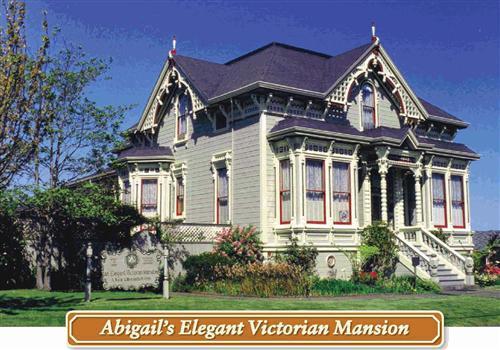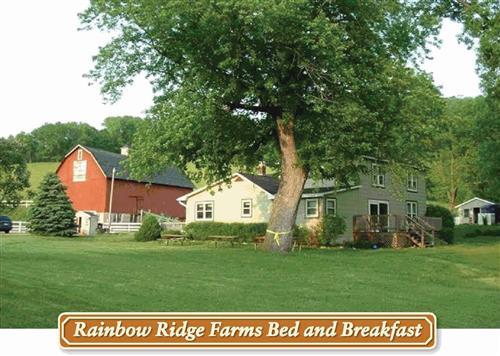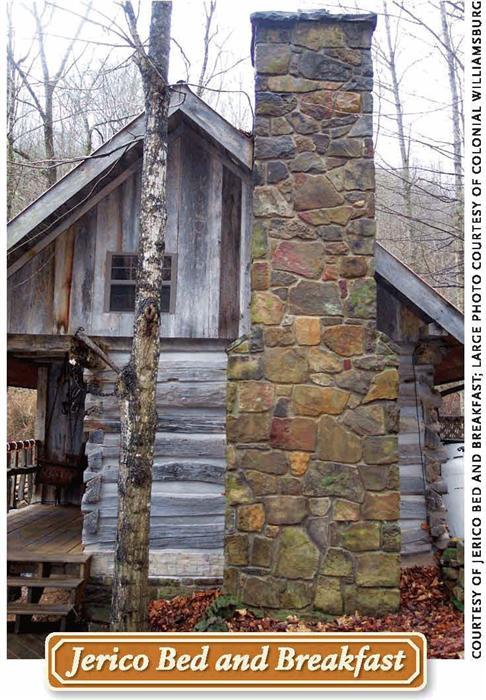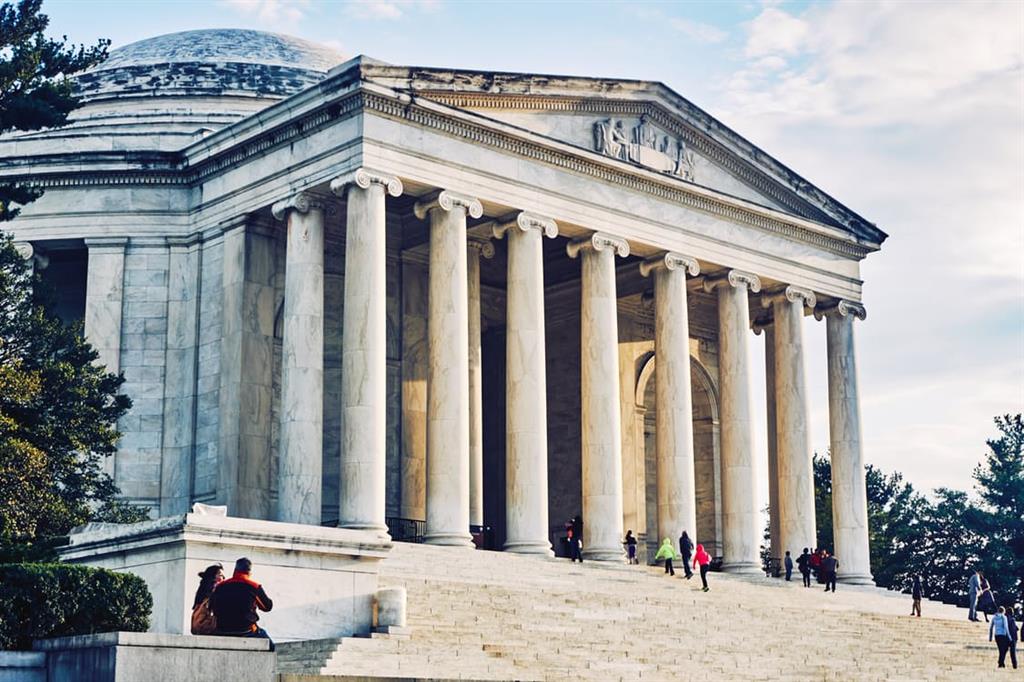When genealogist Kitty Ross booked an overnight stay at the Jerico Bed and Breakfast in Marlinton, WV, she knew she’d be reliving memories. The room she reserved had been the log schoolhouse of her childhood days. But she didn’t expect to stumble across a family story that predated her own existence.
“I started school in that building when I was 7,” says Ross. “What I didn’t know until I stayed there was that my great-great-grandfather had built it. But I looked up and there was his name — Joel Osborn Hill — carved into one of the old chestnut logs inside.”
Heritage travelers like Ross often stay at historical lodgings to give themselves a better sense of their forebears’ lives. Whether your ancestors lived in a log cabin or lighthouse, a castle or a Colonial, you too can rest your head where they did by spending the night in these beautifully restored — or authentically rustic — historical lodgings across the United States.
Colonial comforts
The grand dame of historical getaways has long been Colonial Williamsburg <www.history.org>, a restored 18th-century living history town in Virginia. Overnight guests can stay in one of 75 rooms scattered throughout town in Colonial Houses — homes, taverns, offices, shops, tenements and even slave quarters.
“You might wake to the smell of a woodburning fireplace or the sound of horses on Duke of Gloucester Street,” says Barbara Brown of the Colonial Williamsburg Foundation. Step outside, and you can watch the local milliner at work or listen to the clang of a blacksmith’s hammer. In the evenings, feast on delicacies of days past at the King’s Arms Tavern, an 18th-century-style chophouse.
Colonial Williamsburg’s rooms are furnished with antiques and authentically reproduced period furnishings. Careful, though — the chamber pot is just for show. Rates are around $200, but vary by season and accommodations.
Cabin fever
Perhaps no type of house says “Americana” more than a chinked log cabin. Fortunately for the heritage traveler, plenty of historical cabins welcome weary guests around the country.
Take Jerico Bed and Breakfast <www.jericobb.com>, for example, which boasts several pre-Civil War cabins on property that’s been in Tom Moore Jr.’s family since the 1700s. Union soldiers camped out on its steep hillside and sewed their uniforms with needles and thread borrowed from Tom’s great-grandparents. The troops buried 16 members of their regiment in the nearby meadow.
“We get a lot of people in here doing family history research,” says Moore’s wife, Lindie. She mentions the nearby Droop Mountain Battlefield, West Virginia’s largest Civil War battleground. “People go to the cemeteries and look at the names and years, and then go right to the library.”
Tom Moore has spent years finding and reconstructing old log cabins. He’s sited them on wooded hillsides unchanged by modern development, re-created the chinked-wall interiors and rebuilt stone fireplaces. Rates for lodging in one range from $75 to $205 per night.
A Moore relative owns the log school-house Kitty Ross bunked in, so make a special inquiry if you’d like to sleep there. Staying in the school (and one of the cabins, on another trip) has helped Ross better understand her ancestors. “I have more of an appreciation for what they did and how they lived.”
The owners’ love for history makes them a valuable genealogical resource, too. “They know where all the cemeteries are,” Ross says. “I was looking for a particular cemetery, and Tommy’s father got in the car and said, ‘Follow me.’ They also know a lot of the older people who live there, and they can direct you to anybody you want to meet.”
Southern hospitality
Not every historical American lodging is a rustic cabin. Many of the country’s best inns are also some of its grandest old homes.
If your family tree grows south of the Mason-Dixon line, settle in for an overnight stay at Oak Alley Plantation <www.oakalleyplantation.com> in Vacherie, La. For $130 to $180 a night, you can sleep in a 100-year-old sharecropper’s cottage on the grounds of a former plantation.
Especially if your ancestors were plantation owners, slaves or sharecroppers, Oak Alley can teach you more about their lives. “We touch a little on slavery and the Civil War and how people lived at that time,” says spokesperson Debra Mayhew. “The [cash] crop here was sugar cane, but everything they had was grown on the plantation. It had to be self-sustaining here.”

Victorian villa
Do you have tintype images of ancestors in starched Victorian duds? Connect with their era at one of hundreds of restored Victorian mansions around the United States, from Alaska to Maine, California to Georgia, and everywhere in between.
You’ll find an authentic Victorian experience at Abigail’s Elegant Victorian Mansion <www.eureka-california.com/mansion.php> in Eureka, Calif. The innkeeper, a former history teacher, considers it his mission to give guests an accurate, interactive look at the past.
“History has the potential of being one of the driest, dullest subjects imaginable,” admits Doug Vieyra. “You’ve got to make it fun, make it real. This house is my classroom, and the people who come to stay here are my students.”
Vieyra offers visitors to his 1888 mansion more than just period wallpaper. There’s croquet on the lawn, Victorian-style flower gardens for strolling, and silent movies in the evening. But that’s not all. The chamber pots under these beds are for real. Don’t worry, though — rooms also have private baths, one with a “modern” 1906 pull-chain commode and claw-foot tub.
“There’s almost nothing here to read except stuff from the 1890s to 1910s,” says Vieyra, who particularly likes an 1895 volume on maintaining a house and keeping servants. “You can also crank up the gramophone and listen to old-time records.” Even the cleaning staff keeps things authentic, using carpet sweepers and rug beaters instead of vacuums.
What Abigail’s does, Vieyra says, is “reinforce that history can be fun and that reaching back into the past can be fun. It [also] helps you understand what Great-uncle Stan’s life was all about, his good times and bad times.”
Rates range from $165 to $215. Like many great historical lodgings, Abigail’s is nestled within a larger historical area boasting thousands of homes dating back to the 1850s. You can take horse-drawn carriage rides or bay cruises on a 1910 motor launch, or visit still-operating millworks.
Medieval moments
Believe it or not, you can sleep in even grander places than antebellum plantations and sprawling Victorians. If noble European blood flows in your veins, perhaps you’d like to spend the night at the Castle Inn Riverside <www.castleinnriverside.com> in Wichita, Kan.
“Our castle is an exact replica of a Scottish castle built several hundred years ago, about 30 miles south of Edinburgh,” says owner Terry Lowry. In the late 1800s, the first owner-builder fell in love with the original while touring Europe. He borrowed the architectural drawings, built his own castle in Wichita, and filled it with antique fireplaces, windows, woodwork — including a 275-year-old staircase from London — and other treasures collected abroad. The themed rooms range from $125 to $275 per night.
Many visitors come for the history the castle represents. “Some guests have relatives from Scotland,” Lowry says. “And medieval history buffs love this place. A few even come in costume.”

Country living
Let’s face it: Most of our ancestors didn’t live in castles or mansions. They were commoners. You probably have a hard-working farmer or rancher in the family tree, and outfits such as Rainbow Ridge Farms Bed and Breakfast <www.rainbowridgefarms.com> in Onalaska, Wis., can give you a peek into their world.
“This is one of the area’s original farms,” says co-owner Cindy Hoehne. The house and barn, nestled in a valley surrounded by bluffs, are more than 100 years old.
Besides just staying in an old farmhouse (rates vary by season, from $80 to $150), you can try out your ancestors’ chores. “Our guests often feed the animals with us,” says Hoehne. “Chickens, sheep, llamas, goats and ducks. It’s fun to go milk the goats and then come in the house and make cheese.” She also treats guests to her homemade goat’s milk soap.
Some guests like to earn their breakfast the old-fashioned way, by gathering the eggs that go onto their plates. But one of Rainbow Ridge Farms’ most popular draws — no kidding — is kidding weekend. “I have people who come specifically when the majority of my goats are due,” says Hoehne. “They come in their oldest clothes, and help deliver the animals and bottle-feed the baby goats.”
You can get a good idea of the work your ancestors put into their own farm. “We’re not modernized,” Hoehne says. “I have a bucket and a scoop, and that’s how I feed the animals. There are no skid-loaders taking the hay to the animals: You drop a bale off the hayloft yourself.”
The guest experience is equally timeless, thanks to details such as claw-foot tubs, quilted bedspreads, crowing roosters and the smell of fresh-cut hay. Guests, Hoehne adds, “say this is what Grandma’s house used to be like.”
If you’re interested in a little time travel this summer, you can find more historic places to rest your weary head on the “Great Lodges” companion Web site <www.pbs.org/opb/greatlodges>, the National Trust for Historic Preservation’s Historic Hotels of America site <www.historichotels.org> and in our online guide.





